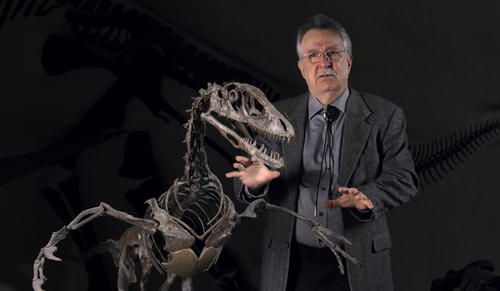
“When Whales Walked,” a new TV documentary on the evolutionary origins of some of nature’s most spectacular animals, will feature research and commentary from a pair of Yale paleontologists.
The documentary, created in a first-ever partnership between PBS and the Smithsonian Channel, premieres at 9 p.m. ET on June 19. The film includes footage shot at the Yale Peabody Museum of Natural History with Jacques Gauthier, professor of geology and geophysics and curator of vertebrate paleontology and vertebrate zoology, and Bhart-Anjan Bhullar, assistant professor of geology and geophysics and assistant curator of vertebrate paleontology and vertebrate zoology at the Yale Peabody Museum of Natural History.
The documentary will showcase research at Yale and other institutions that has provided new insights into the evolutionary beginnings of crocodiles, birds, whales, and elephants. “It highlights four major transitions in the history of life on our planet,” said Bhullar.
The show chooses a “hero” animal for each of the four segments, and two of those hero animals come from the collections at the Yale Peabody Museum of Natural History.
In the bird segment, the featured animal is the dinosaur Deinonychus, whose discovery was a key event in our unfolding understanding of the connection between modern day birds and dinosaurs. In the crocodile segment, the featured animal is a still-unnamed, land-dwelling, coyote-like crocodile specimen that was collected recently as part of the Peabody’s ongoing fossil-hunting expeditions.
“It’s the only complete skeleton of its kind ever discovered,” Bhullar said of the crocodile “hero” animal, a sphenosuchian crocodylomorph. “Our team found it beneath the only known skeleton of another crocodile relative, the giant Poposaurus, which was a croc trying to be a dinosaur, striding around on two powerful legs remarkably similar to those of Allosaurus and Tyrannosaurus rex. Poposaurus is also featured in the documentary.”
Gauthier was interviewed for the segment on the origins of birds; Bhullar was interviewed for the crocodile origins segment. The filmmakers spent several days on campus filming for the project.
“Once they arrived, they became very excited about the treasures we have in the collections at the Peabody, and the research being done here,” Bhullar said.